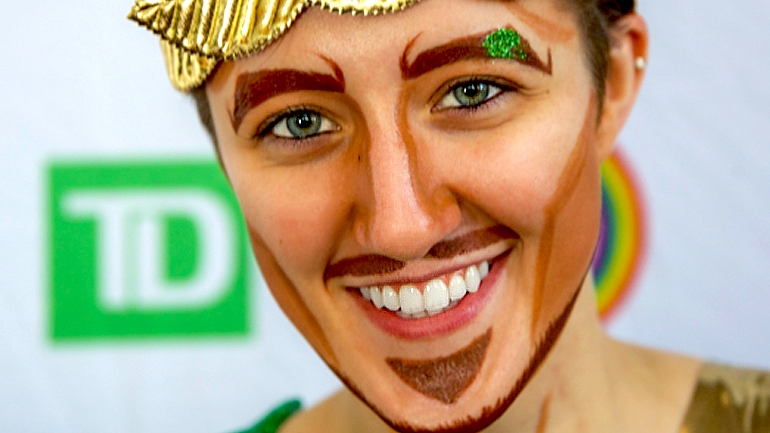Many of us are familiar with drag queens who wear elaborate makeup and costumes to perform as exaggerated versions of women, but did you know that people of all genders and sexualities perform drag?
Lesser known are drag kings—usually a female who dresses as an exaggerated form of a man to personify and challenge male gender stereotypes.
During Montreal's recent Pride festivities, we sat down with Kelly Holzmuller to talk about her performance as Will Charmer, an energetic drag king who is raising the profile of this form of expression in Montreal, and about how drag kings contribute to diverse and inclusive communities.
Q: What is a drag king?
A: In short, the reverse of a drag queen. A drag king is usually a female entertainer who performs as an exaggerated form of a man. It is a caricature. For example, you could have eight-pack abs or look and act overly macho.
Q: When did you start performing as a drag king?
A: I first learned about drag when I was 17. I had just come out as a lesbian and with a new acceptance and expression of who I was, I started researching. I also began learning how to aesthetically express my true self, and as I learned that I was much more of a masculine person I Googled tricks on how to live as a male without hormones which led to drag king makeup tutorials to subtly transform my face. I realized that I didn’t need to transition from female to male because I was comfortable with my biologically female body, but I felt the need to express my masculinity.
My best friend helped me through this journey and introduced me to the term Genderfluid. Once I found a way to balance my gender expression I viewed drag kings as an entertainment art form that I wanted to try.
My first drag performance was in 2017 at a drag boot camp called Drag Moi. Drag kings were rarely seen in Montreal at the time, so I wanted to show that one existed and got to live out my dream of performing. I loved every second.
Q: Why is it important for drag kings to be represented at Pride festivities?
A: Having drag kings represented at Pride is just as important as including all the facets of the LGBTQ2+ community. Drag kings are another, just as valid, part of the drag community. Like queens, kings can be an icon for someone looking for inspiration or acceptance. Seeing someone embody a feeling or desire you have through a positive, loving and supportive light can give them the strength they need to continue their journey of self-discovery.
Q: Why is this form of expression important from a diversity perspective?
A: Drag has branched out from its traditional drag queen roots into an art form that can be practiced by anyone, no matter their gender or sexuality. This has allowed us to inform people about all of the different variations of gender and sexuality, using drag to promote positivity and show that anyone can be fierce.
Q: Tell us about your drag king persona, Will Charmer.
A: Will Charmer plays on the sentence “will charm her.” Will is a storyteller who loves to perform to anything from Elvis to Frank Sinatra, Sean Mendes, Freddie Mercury or Bon Jovi.
I like to describe him as the high school heartthrob. He is very confident in his appearance and his ability to catch the eye of anyone in the room.
Q: What would you like people to know about drag king's that they may not know already?
A: Drag Kings may not be as mainstream as drag queens, but we are equals. Whether you are a king or queen, the respect and love we have for each other is what helps our community grow. We must support one another and work together to achieve our goals to avoid a community filled with negativity.
Something everyone should also remember about any drag performer is that we are people. Even if as entertainers we sometimes act as if we won’t be hurt by words or someone's actions, we like to be treated with respect.
